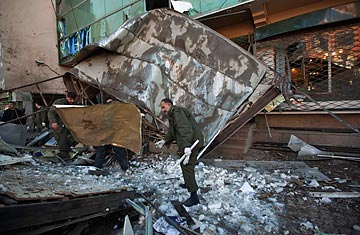
Afghan security personnel collect items at the site of an attack in Kabul. A suicide bomber targeted the Safi Landmark, killing two guards and wounding several others
The scene of Kabul's latest terrorism attack left the entrance to a major mall and hotel complex a crumpled heap of broken glass and blackened, twisted metal. A bulletproof sliding glass door at the entry was pocked with automatic-rifle fire. Just feet from the explosion, the interior of a juice shop was left a slippery mess of glass shards, pomegranates and bananas. Many windows in the center and in nearby shops were blown out. Then a grisly sight: a hollowed-out, scorched human head and leg with its foot still in a military-style boot on the sidewalk among the debris.
At about 1:45 p.m. on Monday, a Taliban suicide bomber killed himself and two security guards at the entrance to the Safi Landmark, a popular Dubai-owned shopping and meeting place for foreigners and wealthy Afghans that is located in the tightly protected center of Kabul. As dozens of Afghan police and military personnel arrived at scene, the Taliban sent a text message to journalists, claiming responsibility for the bombing. The blast wounded two others, Kabul City police said, Afghan media reported. Insurgent spokesman Zabihullah Mujahid said four suicide bombers entered the complex to attack foreign officials who were holding a meeting inside. But the police later said there was only one attacker, the bomber himself.
It was not the first time the Safi Landmark had been touched by terrorism. The complex was heavily damaged a year ago, when suicide attackers struck two nearby guesthouses, killing 20 people, including nine foreigners. Monday's bombing, however, is ominous. It is the second in three weeks in Kabul after months of relative quiet in the capital. On Jan. 28, a Taliban suicide attacker detonated his vest in an upscale supermarket that left eight dead, including foreigners. (On Saturday, Kandahar city was shaken when insurgent forces carried out a major assault on police headquarters, killing 19 and wounding more than 49 using suicide vests, small arms, grenades and vehicles packed with explosives.)
Before the attacks, some analysts thought the government might have secretly reached an informal cease-fire with the insurgents around Kabul in the past few months to allow for breathing room as all parties worked to begin peace talks. It was a claim all sides denied, and it now looks as though any such deal, if it existed, may be off. There is little evidence of movement toward an end to the fighting.
"The insurgents are under more military pressure now. These bombings are the only way they can pressure the government, and they will keep this pressure up," says Gran Hewad, a political researcher at the Afghan Analysts Network (ANN). Hewad characterized the bombing in Kabul as being one of opportunity against a relatively soft civilian target, while his colleague at the ANN, Fabrizio Foschini, says the Taliban's Kandahar attack was aimed at "carrying out hyper-violent shows of force to show that they are very active and can still hit the center of Kandahar" — even after the increased tempo of military operations in the south and increased police presence on the streets of the city in recent months.
After Monday's bombing, many international organizations in Kabul locked down their staffs. Nevertheless, few local businessmen believe the security climate in the city will have changed irreversibly. "Business was slow after the bombing of the supermarket a few weeks ago. There were fewer customers in the restaurant and in the rooms — but business was not too slow. Now it is back to normal," says the Afghan manager of a local restaurant and guesthouse that is frequented by foreigners in the same neighborhood as the bombed supermarket. He spoke on condition of anonymity because he did not have authorization to speak.
"Security contractors will go to lockdown and business will tail off for a bit, but it will return to normal. We're looking at security on a case-by-case basis, but for the people living here, not much will change," says a foreign security manager, also on condition of anonymity. He adds that there is little information that the supermarket and shopping mall attacks are related. "These are targets of opportunity," he says.
While the bombings may not dramatically affect the mentality of people or businesses in Kabul, they have come at a time of political instability as President Hamid Karzai battles with the parliament — a body that had been widely hoped to be a check on the President's power. After Karzai delayed the inauguration of the body by a month, police and investigators raided the Independent Election Commission and a warehouse early this week, seizing data and ballots from the contested September election. The move is seen by Western diplomats as a possible attempt by Karzai to instigate a recount or annulment of the election tallies because the results are seen as not being in his favor.
The political wrangling and insurgent bombings in the capital came as the Taliban, alluding to the fall of Egypt's Hosni Mubarak, warned in a statement on its website that "many weapons and soldiers and much foreign assistance cannot keep a regime in power and ... cannot always hinder the caravan of 'hope and demands' of a nation," according to SITE Intelligence Group and AFP. The statement said that the Afghan people would revolt and overthrow the U.S.-backed government in Kabul.
In a sign that more bombings and attacks are planned, the Department of Defense released a statement on Feb. 11 that security forces in Kandahar province had arrested a man transporting more than 13 tons of ammonium nitrate, a fertilizer that is illegal in Afghanistan because it is commonly used by insurgents to make explosives. "There will be more bombings. There will be more pressure on the Taliban because there are more NATO and Afghan military operations planned, and the insurgents must react," says Hewad, from the ANN.
